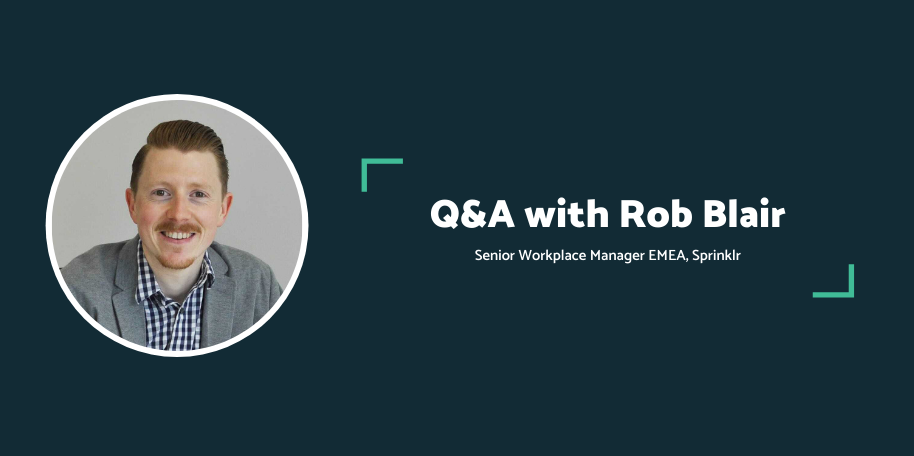
Schedule a demo with us
We can help you solve company communication.

Workplace experience is ever-evolving. When the world was flipped upside down and companies went remote, it took agile, empathetic leaders to adapt and set new standards for creating human-level experiences at scale. We love a good workplace story, so it was great to speak with Sprinklr's Senior Workplace Manager Rob Blair and get a glimpse into his world.
Absolutely. I feel fortunate for the increasing influence hospitality has played in workplace roles. While it's never been considered a negative, hospitality is now seen as a key aspect of most workplace job descriptions. The idea of providing a warm, hospitable environment has been ingrained in me, particularly from my time leading front of house teams at luxury hotels where you only get one chance to land the right welcome and set the tone.
It's probably the biggest challenge we've faced as a global team this past year. It's key to listen and learn from your main connections and stakeholders in each region. Learn about their culture and partner with them to understand how they're feeling, how best to connect with them, and what sort of engagement methods work best. Don't expect one piece of content to land the same way in New York as it does in Paris.
It's absolutely a huge loss. Those impromptu connections are invaluable in making new friends and reconnecting with old ones. I think this extends into wider social skills that particularly young people are missing out on from not being in communal environments like offices. You learn a lot about yourself and how to work with others in those types of places. Supporting that wider connection to other individuals and teams is key to culture, maintaining relationships, and learning.
We address these challenges in several ways. Primarily through the typical Zoom team hangouts and team-building shenanigans. Our team helps by sharing a mix of relevant cultural, educational, and playful content across our Slack channels. The key to this is making it meaningful and intentional, even if it's just a silly meme.
We also take time to reach out to people on a 1:1 basis who we've never met before, just to check in and see how they're doing. We drop into other team's meetings to share what's going on in the business outside of their daily grind, as well as share resources available to them.
One of our biggest successes has been the introduction of an internal TV show. Our co-hosts interview colleagues from across the company to uncover personal stories, play games, and highlight successes. It's been a great way to spread joy and keep everyone connected to the culture from around the world. It lands in everyone's inbox every weekday, so no matter if someone's in Bangalore, San Francisco, or Madrid, they have something that keeps them connected to our community and values.
I think it's evolved tremendously. If we weren't already, we needed to become experts in H&S and risk management to deliver a safe yet productive environment while continuing to make the best experience possible for those in our care.
For those of us not in offices, the focus became more on remote engagement - doing our best to keep everyone connected to company culture while continuing to drive a sense of belonging to combat loneliness. Without sounding too dramatic, it's adapt or die, right? You have a duty of care for your employees to provide the best experience. So do your best to adapt, try new things, and be prepared to fail, but take away learnings where you can. If you lead with empathy and compassion, put your people first - that's the best place to start. You can work backwards from there.
I expect this to vary from business to business, depending on their culture and how their people want to operate. At Sprinklr, our offices are our culture hubs - where we collaborate, learn, grow, and celebrate our successes together. So I don't see them going away any time soon.
Will we look to reduce our traditional office footprint as a reaction to the pandemic, with a shift toward hybrid working? Not necessarily. But if occupancy levels take a prolonged nosedive and culturally we shift to a more remote operation, then perhaps so. Whatever we do will be based on hard data, and most importantly, with our people's productivity and well-being in mind.
Rob Blair is Senior Workplace Manager for the Europe, Middle East, and Africa region at Sprinklr. Be sure to check out his blog, Rethinking WX, where he explores all things workplace and the future of work.
Easy to set up and adopt. No credit card needed.